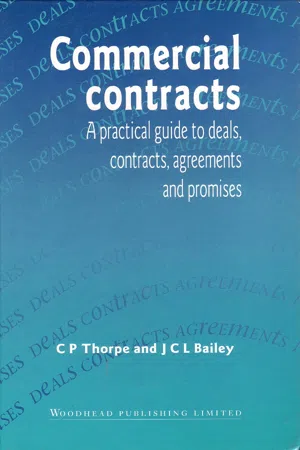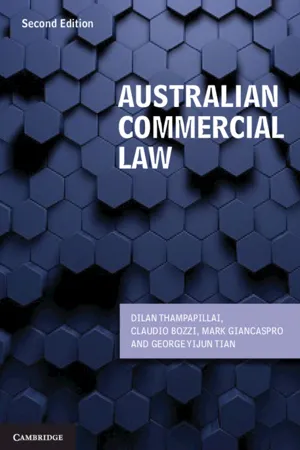Law
Commercial Agreement
A commercial agreement is a legally binding contract between two or more parties for the exchange of goods, services, or other valuable considerations. It outlines the terms and conditions of the business relationship, including payment terms, delivery schedules, and dispute resolution mechanisms. Commercial agreements are essential for establishing and regulating business transactions and are enforceable under contract law.
Written by Perlego with AI-assistance
Related key terms
1 of 5
3 Key excerpts on "Commercial Agreement"
- eBook - PDF
Commercial Contracts
A Practical Guide to Deals, Contracts, Agreements and Promises
- Chris Thorpe, John Bailey(Authors)
- 1996(Publication Date)
- Woodhead Publishing(Publisher)
This of course covers the majority of commercial transactions, excluding only the very large and the very small. When in this situation a dispute subsequently arises about whether there was a contract or what the terms of it were, the court will resolve those issues by a rigorous examination of those com-munications in terms of offer and acceptance. As we shall see in relation to standard terms and conditions, in some situations the 51 the terms of the contract being contained in the memorandum and articles of association of the company. But I have no idea who the other shareholders are, and it is very hard to see how there can be an offer and an acceptance between parties who are not even aware of each other's existence. Commercial contracts 3.2 Consideration The words 'contract', 'deal' and 'transaction' all carry with them the notion of an exchange, typically the exchange of goods or services for money. An agreement which lacks this element of mutuality would not be called a deal or transaction and is not in legal terms a contract. So if A agrees to sell his car to B for £100, that is an enforceable agreement. But if A agrees to give his car to B, B cannot enforce that agreement against A. The legal expression of this requirement is that, for an agreement to amount to a contract, each party must 'provide consideration' for it. 3.2.1 The requirement of consideration Exactly how 'consideration' should be defined is a favourite aca-demic question, but the best way to think of it is this: a party provides consideration if the agreement involves him undertaking to do something. If each party undertakes to do something, then the requirement of consideration from each party is satisfied. But if one party has not undertaken to do anything, then the agreement is completely unenforceable because that party has provided no consideration. - eBook - PDF
International Commercial Agreements
An Edinburgh Law Guide
- Michala Meiselles(Author)
- 2013(Publication Date)
- EUP(Publisher)
1 Planning an International Commercial Agreement Contents Overview 1 Glossary 1 I Form of international Commercial Agreements 3 II Subject matter of the contract 4 III Parties contracting 4 IV Trade barriers 5 V Implied terms 8 VI Adaption of the contract 10 VII Renegotiation of terms 11 VIII Dispute resolution 12 IX Researching local law 18 X Available entry strategies 25 Summary 27 Useful links 27 Further reading 27 Notes 28 Overview This chapter will examine certain matters that are relevant when considering the con-tractual process in the international busi-ness context. Firstly, it will examine the general issues that should be considered and addressed when planning an interna-tional Commercial Agreement. Secondly, it will make reference to the question of dispute resolution. Finally, it will con-sider the different strategies that a business entity may opt for when looking to expand operations abroad. By the end of this chapter the reader will have a better understanding of • the main concerns associated with inter-national contracts; • the impact of tariff and non-tariff barriers; • the importance of planning for potential disputes; • the key characteristics of media-tion, conciliation, arbitration and liti- gation; • the importance of researching the law in the target market; and • the structures available to an entity looking to expand its operations abroad. Glossary Ad valorem duty A duty fixed as a percentage of the value of the goods. Alternative dispute resolution clause See out-of-court settlement clause . Bilateral trade agreements Trade agreements entered into by two countries. Choice of court clause (also known as choice of jurisdiction clause or choice of forum clause ) A contractual term that specifies in which court the party looking to 2 PLANNING AN INTERNATIONAL Commercial Agreement pursue the matter will need to commence a legal action. - eBook - PDF
- Dilan Thampapillai, Claudio Bozzi, Mark Giancaspro, George Yijun Tian(Authors)
- 2020(Publication Date)
- Cambridge University Press(Publisher)
This dif fi culty in part stems from the fact that the term refers not only to the bargain manifested between the parties, but often also to the physical form of that agreement. That is, ‘ contract ’ describes not just the substance of the agreement but, where a written agreement is used, the document itself. Most people in business assume a ‘ contract ’ to be simply a written agreement. However, a contract does not need to be written down, and so it is probably more accurate to de fi ne a contract as an agreement or set of promises made between parties that the law will enforce. 2 In whatever form, for an agreement to be a ‘ contract ’ it need only satisfy four key requirements, which will be discussed later in the chapter. Importantly, gifts and social agreements are not ‘ contracts ’ and so are not legally enforce-able. These do not carry the force of law because they either lack consideration (in the case of gifts, as we will discuss in detail shortly) or were objectively not intended to attract legal consequences if breached. If the law regarded all such agreements as contracts, then legal liability would be unintentionally assumed in a countless number of situations and the courts would be inundated with (largely trivial) lawsuits. As such, the law of contract is careful to identify whether an agreement bears all the hallmarks of a legal contract or whether it is simply an unenforceable arrangement. ................................................................................................................................................................................................................................. 1 Biotechnology Australia Pty Ltd v Pace (1988) 15 NSWLR 130, 132. 2 See M Giancaspro and C Langos, Understanding Contract Law: A Practical Guide (LexisNexis Butterworths Australia, Sydney, 2016), 24 and the authorities there cited. 1 4 PART 1 AUSTRALIAN COMMERCIAL LAW
Index pages curate the most relevant extracts from our library of academic textbooks. They’ve been created using an in-house natural language model (NLM), each adding context and meaning to key research topics.


